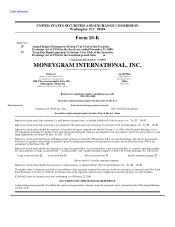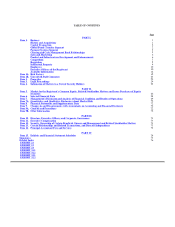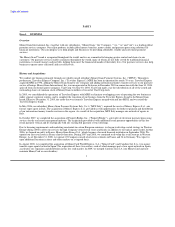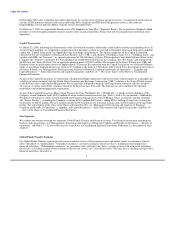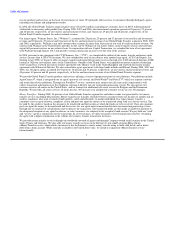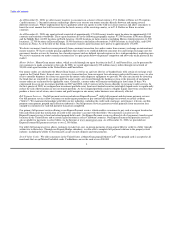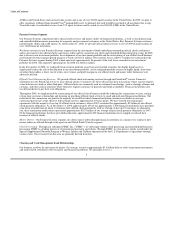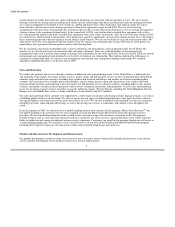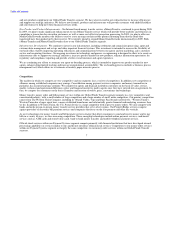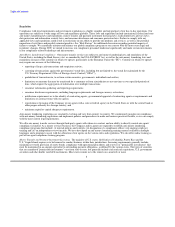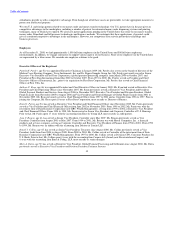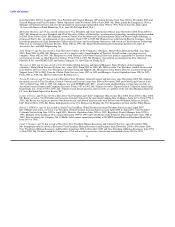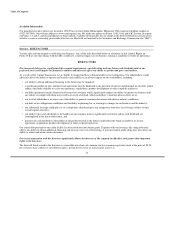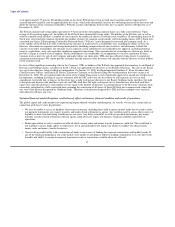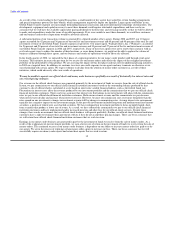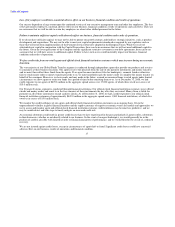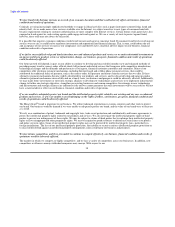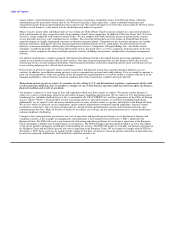MoneyGram 2008 Annual Report Download - page 12
Download and view the complete annual report
Please find page 12 of the 2008 MoneyGram annual report below. You can navigate through the pages in the report by either clicking on the pages listed below, or by using the keyword search tool below to find specific information within the annual report.
Table of Contents
frequent basis to verify our compliance with their requirements. Many states also subject us to periodic examinations and require us and
our agents to comply with federal and state anti-money laundering laws and regulations.
In connection with the Capital Transaction, we sold certain investments at a realized loss of $260.6 million. As a result of these portfolio
sales, we were not in compliance for a brief period of time with minimum net worth requirements of the states in which we are licensed to
conduct our money transfer and other payment services businesses, as well as certain other requirements of one state. This failure to meet
minimum net worth or other requirements may result in the states imposing certain fines and other penalties in the future, although no
state has taken any action at this time. Upon the closing of the Capital Transaction, we were again in compliance with the minimum net
worth requirements of all states and certain other requirements of one state, and continue to be in compliance.
The European Union has adopted the European Commission's 2007 Payments Services Directive ("PSD"). When implemented, the PSD
will create a new licensing framework for our services in the EU. The initial and ongoing costs to comply with the PSD are not yet
determined and could be significant. The PSD will be effective November 1, 2009, and we are currently undertaking efforts intended to
ensure our organizational readiness for and compliance with the PSD.
Escheatment Regulation. Unclaimed property laws of every state, the District of Columbia, Puerto Rico and the U.S. Virgin Islands
require that we track certain information on all of our payment instruments and money transfers and, if they are unclaimed at the end of
an applicable statutory abandonment period, that we remit the proceeds of the unclaimed property to the appropriate jurisdiction.
Statutory abandonment periods for payment instruments and money transfers range from three to seven years. Certain foreign
jurisdictions also may have unclaimed property laws, though we do not have material amounts subject to any such law.
Privacy Regulations. In the ordinary course of our business, we collect certain types of data which subjects us to certain privacy laws in
the United States and abroad. In the United States, we are subject to the Gramm-Leach-Bliley Act of 1999 (the "GLB Act"), which
requires that financial institutions have in place policies regarding the collection, processing, storage and disclosure of information
considered nonpublic personal information. We are also subject to privacy laws of various states. In addition, we are subject to the
European Privacy Directive (the "Privacy Directive"). We abide by the U.S. Department of Commerce's Safe Harbor framework
principles to assist in compliance with the Privacy Directive. In some cases, the privacy laws of an EU member state may be more
restrictive than the Privacy Directive and may impose additional duties with which we must comply. We also have confidentiality/
information security standards and procedures in place for our business activities and with our third-party vendors and service providers.
Privacy and information security laws, both domestically and internationally, evolve regularly and conflicting laws in the various
jurisdictions where we do business pose challenges.
Other. In the United States, we sell our MoneyGram-branded stored value card and also load stored value cards of other card issuers
through our ExpressPayment system. Stored value services are generally subject to federal and state laws and regulations, including laws
related to consumer protection, licensing, escheat, anti-money laundering and the payment of wages. These laws are evolving, unclear
and sometimes inconsistent. The extent to which these laws are applicable to us is uncertain and we are currently unable to determine the
impact that any future clarification, changes or interpretation of these laws will have on our services.
Intellectual Property
The MoneyGram brand is important to our business. We have registered our MoneyGram trademark in the United States and a majority
of the other countries where we do business. We maintain a portfolio of other trademarks that are also important to our business,
including our ExpressPayment, globe with arrows logo, MoneyGram Rewards, The Power is in Your Hands®, FormFree and
AgentConnect marks. In addition, we maintain a portfolio of MoneyGram branded domain names.
We rely on a combination of patent, trademark and copyright laws, and trade secret protection and confidentiality or license agreements
to protect our proprietary rights in products, services, know-how and information. Intellectual property rights in processing equipment,
computer systems, software and business processes held by us and our
9


